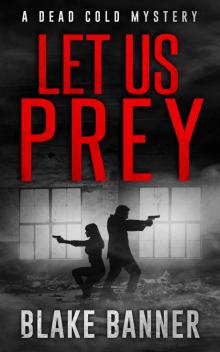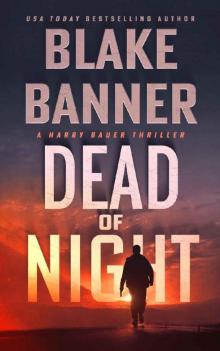- Home
- Blake Banner
Kill - Two Page 15
Kill - Two Read online
Page 15
She ignored him and gestured at the tape around Timmerman’s chest. “What is this?”
“You don’t need to know. Don’t remove it.”
She removed the dressing on his stab wound and then the dressing on his hand. She showed me a face that was close to hatred. “What has happened to this man?”
I said again, “You don’t need to know.”
“You did this to him?”
“He was shot by French special forces.” I gave her a moment to draw the conclusion that maybe we were the good guys. Her face relaxed a little and I said, “Carmen, believe me, the less you know, the better for you.”
She turned away from me, muttering something about animals, and I made an inspection of the apartment. There was one of everything: toothbrush, hairbrush, bathrobe. And there were no photographs of her with any good-looking guys. My concern was not for Njal’s chances, but in case anyone turned up unannounced. By the looks of it, though, I figured she was in her first year of practice, and first year doctors don’t have time for anything but work.
By the time I got back from my inspection, she was stitching up a very ugly wound on Timmerman’s shoulder. When she had finished, she dressed it and bandaged him.
I said, “Will he live?”
“Probably, but he has to be in intensive care. What if he has a crisis? What can I do?”
I threw Njal the keys to the apartment and said. “Go down and get our stuff from the car.”
He caught the keys and went out, locking us in from the outside. I pointed to a chair and said, “Sit down.”
“I like to stand.”
I sighed and smiled. “I need you to sit down, Carmen.”
She went to a chair and dropped into it. I took a chair from her glass dining table and sat in front of her.
“I get that you hate us and think that we are animals. That’s fine. I don’t need you to like me. But I do need you to understand the risks and the dangers of this situation. We are professionals. It is our job to kill people. You understand that?”
She looked a bit sick and nodded.
I went on: “But right now, we need this man to live. It is very important for everybody, for the whole world, that this man lives. We are desperate… desperados… and you really need to understand that we will do anything for this man to live.”
She nodded again, then gave a small shrug. “Desesperados,” she said.
I frowned.
She said, more emphatically, “Des-es-perados. No, desperados.”
I raised an eyebrow. “I will leave in the morning. My colleague will stay with you and this man. Nothing will happen to you. We don’t want to hurt you. We don’t want to hurt anybody. Tomorrow afternoon, my colleague and this man will leave. He will go to a good hospital, and you will never see us again.”
She stared at me for a long moment. “But if I try escape, or call a police…”
I shook my head. “Don’t. You will make us do something that we really don’t want to do, and the consequences will be much, much worse than you can imagine. Carmen, it may be hard for you to believe, but we are the good guys.”
She frowned. “The good guys?”
“Los Buenos.”
She snorted, but I thought maybe she was half convinced.
SEVENTEEN
Next morning at nine A.M., Timmerman awoke. I was sitting in an armchair, covered in a blanket and watching him. His eyelids fluttered a couple of times. Then, his eyes opened and he lay without moving, staring at the wall. He closed his eyes a couple of times and opened them again, like he was hoping that if he kept doing that he might wake up in Brussels or La Grand Ville. He didn’t and eventually sighed.
“Good morning, Jean-Claude. How are you feeling?”
He didn’t look at me. “It hurts.”
“I’ll get the doctor, see what she can give you.”
“Where am I?” I drew breath, but he sighed again and said, “Don’t tell me, I don’t need to know. You and your war games.”
I smiled. “You’re getting the hang of this.”
I called Carmen and she appeared in her bedroom door in the same clothes she’d had on the night before, with bags under her eyes and uncombed hair. She still looked cute.
“Your patient is awake. He’s in pain.”
“Of course he is in pain!”
She went into the bathroom and came out with a box of diazepam. I stood in front of her, blocking her path. She looked up into my face. “What?”
“By four o’clock this afternoon, I need him alert and awake.”
“If he is in pain…”
“Don’t argue with me, Carmen. There is a reason for what I am doing. If he is not awake—and alert—at four this afternoon, people start dying. Lots of people.”
She pushed past me and went to her patient. I went and showered and when I came out of the bathroom buttoning my shirt, Carmen had made coffee and was carrying it to the living room. Njal was in the armchair and Timmerman was sitting up, propped against cushions and looking drowsy. Carmen gave him a cup. He frowned into her face, thanked her in Spanish and turned his frown on me. “What have you done, Lacklan? Who is this poor woman?”
“No more names. She’s a doctor. She’s going to help you until tonight, maybe tomorrow morning. Then we leave her alone and we forget she exists. Now, here is how it goes down.” I pulled on my boots and started to lace them up. “I’m leaving now. I will contact you between four and five this afternoon. If you don’t hear from me, assume I’m dead.” I stood and looked down at him. “At that time, I need you wide awake and alert. If any one of those three passes you gave me does not work, I will call you and give you one more chance. If it fails, I dial one on my speed dial. You understand that, and what happens after.”
He nodded. He looked weary. “I understand.”
I turned to Njal. “You stay focused. Once you get my call, if it’s positive, you take this guy to the airport and you put him on a plane. You go wherever you want. We’ll meet up in a week at your friend’s house. Stay on top of these two, and if they give you any trouble, shoot them.”
Carmen’s face flushed. “He will no be very awake and alert if you shoot him! And I cannot keep him awake if you shoot me!”
I stepped close to her and looked deep into her eyes. “So don’t cause any trouble. Be nice, cooperate, and tomorrow it will all be over.”
I took two hundred euros from my wallet and put it on the table. “That’s for your inconvenience.” To Njal, I said, “Lock the door behind me.”
He followed me out to the landing. There I took his hand and shook it. “In case I don’t see you again. It’s been an honor.”
He smiled. “Fucking Americans. Always with the emotions. If I don’t see you next week, I see you in Valhalla.”
I nodded. “She’s cute, but don’t get sidetracked. She’s smart enough to play you.”
“I know. I am focused.”
“Hang loose.”
“You too. See you on the other side.”
I rode the elevator down, stepped into the bright sunshine of the street, hailed a cab and had it take me to the airport at Jerez. We were not followed, but at the airport, security was high. However, aside from Timmerman, and possibly two other men, they had no idea what, or who, they were looking for.
* * *
It’s a thousand miles from Cadiz to Luxembourg, and we touched down at the principality’s airport at just after two o’clock in the afternoon. Luxembourg airport is small and user-friendly, plus I only had hand baggage, so by two thirty, I was already climbing into a cab and telling the driver to take me to the European Parliament building. It was barely two miles from the airport, along attractive roads that wound through dense woodland up to the Avenue JF Kennedy. He eventually dropped me on a street named, unpronounceably, Fort Niedergruenewald, and after he had driven away, I crossed the JF Kennedy Avenue at the lights and made my way on foot down Rue du Fort Berlaimont toward the strange, hexagonal building of the Ce
ntre de Traduction des organs de L’Union Européenne. On the way, I pulled on the latex thumb-glove we had made at the farmhouse in Cadiz.
I was twenty or thirty yards from the Rue du Fort Thüengen, approaching the intersection, when I noticed the dark SUV approaching from my left down. There was nothing to suggest it was anything but one of several thousand SUVs in Luxembourg. But when I glanced to my right, I saw there was another, almost identical, approaching from that direction. The footfall behind me reached my ears just as the two guys in jeans with leather jackets came around the corner and started walking toward me.
I turned, planning to run. I had heard only one man behind me, but the man behind me was holding a Micro Uzi, with a thirty-two round magazine and a rate of fire of twenty rounds per second, and he was just fifteen feet away. He was wearing the standard French plainclothes, ex-military uniform of jeans and biker jacket, but his fair, pencil mustache, aviators and easy smile said he was an ex-officer.
I heard car doors slam behind me and looked back. There were six of them. They were carrying automatics. Only the boss had an Uzi. He spoke and I turned back to look at him.
“Captain Walker, it is an honor to meet you. I am Captain Berger. We didn’t ’ave time to talk in Cadiz. I hope this time, you will not go running off. I think we ’ave lots to talk about.”
“If I don’t call in between four and five, Timmerman dies.”
He shrugged. “C’est la vie, c’est la guerre, c’est la mort.”
“You mean he’s become expendable.”
He didn’t answer, he just gestured toward the nearest of the SUVs. I walked the short distance to it. They frisked me and found only my cell phone, which Berger confiscated. They bundled me in the back of the SUV and within a few seconds, we were speeding out of the city, going north and east.
“We are not going very far, Captain Walker.” He smiled. “We do not need to take you to another country to interrogate you. Just five minutes up the road is enough.”
We had come to a large intersection and the driver, a bull-necked ox with very short, very blond hair, took the A7 north through very dense woodlands that were turning to copper and rust. After less than a mile, he took a slip road to the right and the forest closed in. Pretty soon, we came to a crossroads. Here, we turned left among green fields, down a track that led to what looked like a seventeenth century chateau, largely concealed by forest and tall, red brick walls.
We pulled up at the front door, on the gravel drive, and we all climbed out. The six gorillas stood around, watching me with dispassionate eyes. Berger pointed at the front door. “Please…” he said. I walked toward it, hearing the clock ticking in my mind. I had an hour, two maximum.
He led me through wooden doors with large, glass panes, into an understated entrance hall with a mahogany staircase leading to an upper floor. I followed him up to a landing that branched into two corridors. He turned left and pushed through the second door on his right into an office with an oak desk, a single chair in the middle of the floor and a window overlooking green fields.
He sat behind the desk and gestured me toward the chair. I looked behind me as the door closed. The ox with the bull neck stood in front of it. I saw now that he had small, piggy eyes and a slight, red mustache. He was flanked on his right by a shorter guy who might have been Arabic or North African, and on his left by a dark-haired man with a face that looked like it had lost a quarrel with a bulldozer, and he was still mad about it.
Berger pointed his Uzi at me. “Put your arms behind the back of the chair.” I didn’t. He shrugged. “If your prefer, I can shoot off your kneecap.”
I put my arms behind my back. Big, hard hands seized my wrists and tied them tight with cord. The ox then came around and tied my ankles to the chair legs. He stood next to me, like he had come to attention, and stood staring at the wall.
“There was a time,” said Berger, “when war was a gentlemanly pursuit. Never would one officer tie up and torture another. He might be your cousin! Your aunt would never forgive you! Today, unfortunately for you, this is not the way anymore.” He suddenly grinned. “We are not related, I think? You have no French aunts, no?”
“OK, so you’re not in a hurry. I get it. What do you want?”
He raised an eyebrow and smiled. “You are in an ’urry, Captain? There is somewhere you need to be?”
I searched his eyes, wondering how much he knew. I shook my head. “No, I think I’ll just stay here and kill you and your men.”
He glanced up at the ox, who turned and gave me a backhander that almost took off my head. When the room had stopped spinning and Berger came back into focus, he said, “I know this is nothing for you. You can do this all day and all night.” He gave a Gallic shrug. “But we like to soften you up a little before we progress to more sophisticated methods. So, Captain Walker, what is your purpose for being in Luxembourg?”
I was aware I could not take too much punishment if I was going to get into the computer lab and perform the task I had ahead of me. At the same time, I couldn’t give in too easy or Berger wouldn’t buy it. I put just enough contempt into my expression and said, “I came to visit your sister at the local whorehouse.”
He leaned back in his chair and laughed out loud with genuine amusement. Then he translated what I’d said to his men. They didn’t laugh. They didn’t think it was funny. They were shocked. The ox gave me another backhander and followed it with two more, right and left. Berger told him to stop. My head felt like I’d just got kicked by a rhinoceros.
Berger was talking again. “OK, Captain Walker, let us begin small and work our way up. You are an American national, correct?”
I grunted, “Yes,” like he’d forced a confession out of me, but I was wondering where the hell he was going.
“But your mother is British, am I correct?”
I narrowed my eyes at him. “You know she is.”
“So, I am wondering, where do your loyalties lie? With your chosen nationality, U.S.A., or perhaps with the regiment that gave you your ’ome for ten years.” He sat back and regarded me like he was being really smart and insightful. “Or is it possible, on the other ’and, that, like Churchill and Roosevelt, you believe that Britain and America should share a common citizenship?”
“What the hell are you talking about, Berger?”
“I think you know perfectly well what I am talking about. You leave the SAS, but only three years later, ’ere you are, on an operation with your old regiment, kidnapping a leading commissioner, for what purpose? Huh? What interest has the U.S.A. in a European commissioner? I will tell you…” He sat forward and slammed his palm down on the desk. “None! Zero! You think we are stupid? This operation you are on, it is totally deniable! You resigned from the SAS, you are an American. They can ’old up their ’ands and say, ‘We know nothing of this!’ But this is your employer, Captain Walker, the Department of Intelligence.”
I gave him the kind of look that says you’ve been caught but you’ll never admit it. I said, “You saw I was unarmed.”
“What is your purpose in Luxembourg?”
The ringing in my ears was decreasing and my brain was starting to work again. But I needed time, time to fit the pieces together. I said, “You were the one in charge of the operation in Cadiz.”
He frowned. “And so…?”
“You were the guy standing when you stormed the front of the house.”
“Correct. But what has this to do with anything, Captain Walker?”
So Omega had contracted out to French security forces. That meant their information was limited. Suddenly, that made sense. These guys had no idea this was an Omega operation. They didn’t even know what Omega was. They were acting on orders and this wiseass thought it was all about the Brits pulling out of Europe and shoring up their bargaining position.
I sighed. “I’m here to present our terms to your employer.”
He raised an eyebrow. “My employer?”
“Yes, Captain Berger, y
our employer.”
He might have known he had an employer, but if he did, he had no idea who it was. So he played his cards close to his chest. He gave a small laugh. “I think you will find your terms are of little interest, Captain. Commissioner Timmerman, as you have seen, is expendable. The Union is not.”
“You’re out of your depth, Captain. You are not qualified to hear or judge the terms that I am instructed to offer. You’d better think carefully about the instructions you have received before you go any further. Somebody is going to be very mad if they don’t hear the offer I am instructed to make.”
“Who were you instructed to make your offer to?”
I shook my head. “You are not cleared to hear that.”
Now he was wondering whether to phone his Colonel. Before he could reach a decision, I said, “What time is it?”
He glanced at his watch. “Fifteen ’undred hours. Why?”
I closed my eyes, thinking hard. Finally, I said, “It’s not your fault. You were not briefed and there was no way you could have known. But we are running out of time. If I don’t get my message to my contact in the next fifteen minutes, President Emanuel Van Zuydam will be executed.”
This he could relate to. He knew about the supposed threat and he had probably guessed that there was some connection between Timmerman’s abduction and the tip off they had received about the threat to Van Zuydam; though he could not have guessed in a million years what that connection was.
He frowned. “What do you know about this?”
“I know where the tip off came from, I know why no attempt was made and I know why you were not able to find evidence of any such attempt on his life. Because at that stage, Berger, it was designed to distract you from Timmerman. We had our own reasons for going after him. Don’t even try to understand. It’s too deep for you. But trust me, there is a cell right now sitting on Van Zuydam, and if I don’t get to…” I hesitated, like I didn’t want to tell him to much. I searched wildly for a name, reached for the next on the Omega list after Van Zuydam. “OK! If I don’t get my message to General Roland Bisset in the next fifteen minutes, Van Zuydam will be assassinated.”

 Verdugo Dawn
Verdugo Dawn Quantum Kill (Cobra Book 4)
Quantum Kill (Cobra Book 4) Dead Cold Mysteries Box Set #1: Books 1-4 (A Dead Cold Box Set)
Dead Cold Mysteries Box Set #1: Books 1-4 (A Dead Cold Box Set) Let Us Prey
Let Us Prey Dead Cold Mysteries Box Set #4: Books 13-16 (A Dead Cold Box Set)
Dead Cold Mysteries Box Set #4: Books 13-16 (A Dead Cold Box Set) Dead of Night
Dead of Night The Butcher of Whitechapel: Dead Cold Mystery 12
The Butcher of Whitechapel: Dead Cold Mystery 12 Omega Series Box Set 2
Omega Series Box Set 2 Little Dead Riding Hood: Dead Cold Mystery 13
Little Dead Riding Hood: Dead Cold Mystery 13 Blood in Babylon
Blood in Babylon Powder Burn
Powder Burn Kill Four
Kill Four Omega Series Box Set 3
Omega Series Box Set 3 Fire From Heaven: Dead Cold Mystery 9
Fire From Heaven: Dead Cold Mystery 9 Kill - Two
Kill - Two Omega Series Box Set 1
Omega Series Box Set 1 The Butcher of Whitechapel
The Butcher of Whitechapel Murder Most Scottish
Murder Most Scottish Dead Cold Mystery Box Set 3
Dead Cold Mystery Box Set 3 Dead Cold Mysteries Books 5-8
Dead Cold Mysteries Books 5-8 LA
LA To Kill Upon A Kiss: Dead Cold Mystery 10
To Kill Upon A Kiss: Dead Cold Mystery 10 Knife Edge (A Dead Cold Mystery Book 27)
Knife Edge (A Dead Cold Mystery Book 27) The Omicron Kill - An Omega Thriller (Omega Series Book 11)
The Omicron Kill - An Omega Thriller (Omega Series Book 11) Immortal Hate (Harry Bauer Book 5)
Immortal Hate (Harry Bauer Book 5) The Fall Moon
The Fall Moon Jack in the Box
Jack in the Box Dead Cold Mystery Box Set 2
Dead Cold Mystery Box Set 2 Dead Cold Mystery Box Set 4
Dead Cold Mystery Box Set 4 Little Dead Riding Hood
Little Dead Riding Hood Gardened of the Damned
Gardened of the Damned The Hand of War
The Hand of War Two Bare Arms
Two Bare Arms Dead Cold Mystery Box Set 1
Dead Cold Mystery Box Set 1 To Kill Upon A Kiss
To Kill Upon A Kiss Breath of Hell (Harry Bauer Book 8)
Breath of Hell (Harry Bauer Book 8) To Rule in Hell
To Rule in Hell Dying Breath (Cobra Book 2)
Dying Breath (Cobra Book 2) A Harvest of Blood - An Action Thriller Novel (Omega Series Book 5)
A Harvest of Blood - An Action Thriller Novel (Omega Series Book 5) A Harvest of Blood - An Action Thriller Novel
A Harvest of Blood - An Action Thriller Novel Ace and A Pair: A Dead Cold Mystery (Dead Cold Mysteries Book 1)
Ace and A Pair: A Dead Cold Mystery (Dead Cold Mysteries Book 1) Omega Series Box Set 3: Books 8-10
Omega Series Box Set 3: Books 8-10 Kill One_An Action Thriller Novel
Kill One_An Action Thriller Novel The Storm
The Storm Double Edged Blade
Double Edged Blade Kill: One - An Action Thriller Novel (Omega Series Book 7)
Kill: One - An Action Thriller Novel (Omega Series Book 7) The Storm - An Action Thriller Novel (Omega Series Book 3)
The Storm - An Action Thriller Novel (Omega Series Book 3) Double Edged Blade - An Action Thriller Novel (Omega Series Book 2)
Double Edged Blade - An Action Thriller Novel (Omega Series Book 2) Dawn of the Hunter
Dawn of the Hunter Dawn of the Hunter - An Action Thriller Novel (Omega Series Book 1)
Dawn of the Hunter - An Action Thriller Novel (Omega Series Book 1)